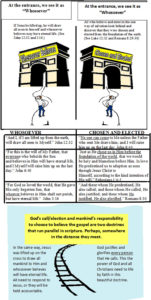The Salvation Process: begins with faith and repentance, and ends in glorification.
1. Repentance means that we “have been saved” from the PLEASURE of sin. It is in the perfect tense. (See Ephesians 2:6-10.)
2. Justification means that we “were saved” from the PENALTY of sin. It is in the past tense. (See Romans 8:24.)
3. Sanctification means that we are “being saved” from the POWER of sin.. It is in the present tense. (See 1 Corinthians 1:18; 2 Corinthians 2:15.)
4. Glorification means that we “shall be saved” from the PRESENCE of sin. It is in the future tense. (See Romans 5:9-10; Romans 10:9; 1 Corinthians 3:15.)
Paul sometimes portrayed the process of salvation in terms of past and present experience and future anticipation. For example, he commended the Thessalonians for the testimony of their faith, “how you turned to God from idols [past] to serve the living and true God [present], and to wait for his Son from heaven [future]” (1 Thess. 1:9–10). But usually he referred to only one aspect of salvation in any given verse.
JUSTIFICATION – The first phase of the experience of salvation [after repentance] is often called justification. The word refers to the acquittal from the penalty of sin that God gives to those who have faith in Christ (Rom. 3:26). The noun (dikaiōsis) occurs only twice in the New Testament, both times in Paul’s letter to the Romans in relation to the work of Christ and its benefit for Christians (4:25; 5:18). In the use of the verb different temporal aspects of justification are seen. Paul told the Corinthians, for example, “you were justified in the name of the Lord Jesus Christ and by the Spirit of our God” (1 Cor. 6:11). This statement illustrates the idea that justification is a declaration of acquittal made by God at the moment of an individual’s faith in Christ. Elsewhere Paul referred to God as the “one who justifies those who have faith in Jesus”

OLYMPUS DIGITAL CAMERA
(Rom. 3:26).
SANCTIFICATION - This aspect of salvation is often regarded as the phase that extends between the beginning (justification) and the end (glorification) of the process of salvation. It could be called the “extended middle” experience of Christian life and practice since both justification and glorification can be viewed as experiences accomplished by God’s declaration and therefore realized immediately. Sanctification, however, usually describes the experience of being set apart by God to belong to Him and be used by Him.
Paul summarized sanctification’s goal in his letter to the Thessalonians when he told them, “It is God’s will that you should be sanctified; that you should avoid sexual immorality.… For God did not call us to be impure, but to live a holy life” (1 Thess. 4:3, 7; the words “holy” and “holy life” translate hagiosmos, a term describing “sanctification”; cf. Titus 2:11–14; 3:4–7). The opposite of holiness, “impurity,” could refer to immorality generally (1 Thess. 2:3), though Paul often used it to describe sexual immorality in particular (e.g., Rom. 1:24).
GLORIFICATION - The goal of the Christian experience of salvation is sharing and participating in the glory of God. As Paul told the Romans, “we rejoice in the hope of the glory of God” (5:2). This hope includes the transformation of mortal life to immortal or eternal life. Paul told the Corinthians that he looked forward to the body being “raised in glory” (1 Cor. 15:43). The “hope of the glory of God” also includes the prospect of unimpaired fellowship with Him, the direct experience of His presence, and completed knowledge of Him. Paul compared Christians’ present experience to the perfect future in this way: “Now we see but a poor reflection as in a mirror; then we shall see face to face. Now I know in part; then I shall know fully, even as I am fully known” (1 Cor. 13:12).
As in the case of justification and sanctification, what Paul said about glorification was closely linked to Christ as well. He told the Romans that Christians are “co-heirs with Christ, if indeed we share in his sufferings in order that we may also share in his glory” (Rom. 8:17). The process of sanctification advances in the context of suffering, as Christ Himself suffered, and culminates in the experience of glory that Christ Himself now experiences. In similar fashion, the apostle told the Thessalonians that God had called them “through our gospel, that you might share in the glory of our Lord Jesus Christ” (2 Thess. 2:14).
(Zuck, R. B. (1994). A Biblical Theology of the New Testament (electronic ed., p. 280). Chicago: Moody Press.)
1. What is justification?
- Justification means by “we were saved” from the PENALTY of sin. The penalty of sin is death.
- We were saved from this penalty by being “legally declared innocent or just” by God through Jesus. Believers do not have to fear death any longer.
- It is past tense, because they are in right standing (righteous) with God. (See Romans 8:24.)
“Being justified as a gift by His grace through the redemption which is in Christ Jesus; whom God displayed publicly as a propitiation in His blood through faith. This was to demonstrate His righteousness, because in the forbearance of God He passed over the sins previously committed.” Romans 3:24-25
- Justification—being made right with God or set free from the consequence of sin—comes as a gift by grace (undeserved favor, i.e., grace is also a gift) through faith in the resurrection of Jesus, conquering death—the punishment of sin.
“He made Him who knew no sin to be sin on our behalf, so that we might become the righteousness of God in Him.” 2 Corinthians 5:21
- God accepts us as righteous
“For if by the transgression of the one, death reigned through the one, much more those who receive the abundance of grace and of the gift of righteousness will reign in life through the One, Jesus Christ. So then as through one transgression there resulted condemnation to all men, even so through one act of righteousness there resulted justification of life to all men. For as through the one man’s disobedience the many were made sinners, even so through the obedience of the One the many will be made righteous.” Romans 5:17-19
- The righteousness of Jesus is accredited to believers.
“Nevertheless knowing that a man is not justified by the works of the Law but through faith in Christ Jesus, even we have believed in Christ Jesus, so that we may be justified by faith in Christ and not by the works of the Law; since by the works of the Law no flesh will be justified.” Galatians 2:16
- Justification is received by faith.
“And may be found in Him, not having a righteousness of my own derived from the Law, but that which is through faith in Christ, the righteousness which comes from God on the basis of faith.” Philippians 3:9
- Believers are justified by faith.
2. How does God see those who have placed their faith in Jesus?
- Justification: We appear before God “just-as-if” we had never sinned.
“Therefore let it be known to you, brethren, that through Him forgiveness of sins is proclaimed to you, and through Him everyone who believes is freed from all things, from which you could not be freed through the Law of Moses.” Acts 13:38-39
- Believers are legally declared not guilty, set free from sin. They are right with God.
“Therefore, having been justified by faith, we have peace with God through our Lord Jesus Christ…(Verse 9) Much more then, having now been justified by His blood, we shall be saved from the wrath of God through Him.” Romans 5:1, 9
- The blood of Jesus paid the price for our sin. Believers appear before God “just-as-if” they had never sinned.
3. How should a justified person live life?
“‘…DEATH IS SWALLOWED UP in victory. DEATH, WHERE IS YOUR VICTORY? O DEATH, WHERE IS YOUR STING?’ The sting of death is sin, and the power of sin is the law.” 1 Corinthians 15:54-56
- Realize that sin was conquered when Jesus rose from the grave. Those who live by faith no longer fears death.
Therefore, since the children share in flesh and blood, He Himself likewise also partook of the same, that through death He might render powerless him who had the power of death, that is, the devil, and might free those who through fear of death were subject to slavery all their lives.” Hebrews 2:14-15
- Sin and death are no longer our master. We live for Jesus and the abundant life we have in Him. This is FREEDOM!
“Do not fear what you are about to suffer. Behold, the devil is about to cast some of you into prison, so that you will be tested, and you will have tribulation for ten days. Be faithful until death, and I will give you the crown of life.” Revelations 2:10
- Christians should not fear persecution. Jesus overcame persecution and death.
“Do not fear those who kill the body but are unable to kill the soul; but rather fear Him who is able to destroy both soul and body in hell.” Matthew 10:28
- Believers should keep the faith.
“But by His doing you are in Christ Jesus, who became to us wisdom from God, and righteousness and sanctification, and redemption.” 1 Corinthians 1:27
- Praise God
Sanctification is Positional and Progressive
Sanctify comes from the Greek word hagiazo, it means to be separated from things that go against God’s Law and to be dedicated to Him. It means to be holy. The words “saint” and “holy” come from Greek hagios, which is the same basic Greek word as hagiazo . To be sanctified is to be a saint, which is to be holy.
In reference to the believer, the sanctification process is like salvation in that it is a process. It is past tense, present tense, and future tense. Believers have been sanctified (past tense) when they were placed in Christ through faith; they are being sanctified as they conform to His ways (present tense); and will be fully sanctified (future tense) meaning they will be made completely perfect and holy. The process of sanctification starts at the believer’s new birth and continues until their glorification.
4. How does the sanctification process work?
“Therefore we have been buried with Him through baptism into death, so that as Christ was raised from the dead through the glory of the Father, so we too might walk in newness of life.” Romans 6:4
- Believers have the power to live a new life in Jesus.
“Knowing this, that our old self was crucified with Him, in order that our body of sin might be done away with, so that we would no longer be slaves to sin.” Romans 6:6
- Believers are no longer a slave to sin. FREEDOM as they find no joy in sin.
“But we should always give thanks to God for you, brethren beloved by the Lord, because God has chosen you from the beginning for salvation through sanctification by the Spirit and faith in the truth.” 2 Thessalonians 2:13
-

OLYMPUS DIGITAL CAMERA
Sanctification is part of God’s free work of grace which comes by means of the Holy Spirit as the believer grows in knowledge of the truth and applies that knowledge to their life by faith.
“And that you be renewed in the spirit of your mind, and put on the new self, which in the likeness of God has been created in righteousness and holiness of the truth.” Ephesians 4:23-24
- Sanctification happens as believers are being renewed in their minds through the Spirit and His Word into the image of God. They are transformed by Truth.
“Therefore there is now no condemnation for those who are in Christ Jesus.” Romans 8:1
- Believers are being conformed into the image of Christ and there is no eternal disapproval of them as they learn and desire to be like Christ in all their ways. Sanctification is a process. Christians are to daily confess their sins, ask forgiveness to all whom they offend, and set their hearts on loving, trusting, and obeying God.
5. In what way are believers sanctified (past tense)?
6. In what way are believers being sanctified (present tense)?
- SAINTS ARE BEING CONFORMED TO JESUS’ HOLY IMAGE!
“But sanctify Christ as Lord in your hearts, always being ready to make a defense to everyone who asks you to give an account for the hope that is in you, yet with gentleness and reverence.” 1 Peter 3:15
- Believers are positioned in Christ. They are all saints. Because they are saints, they are to live as saints by removing unholy things and activities from their lives. Removing sin from their lives is sanctifying Christ as Lord. Therefore, do not see yourself as a sinner and live like a sinner, but remove unholy things from your life and live for Jesus. As you do, you will become more and more like Him—this is the meaning of being sanctified.
“But now having been freed from sin and enslaved to God, you derive your benefit, resulting in sanctification, and the outcome, eternal life.” Romans 6:22
- Believers are being sanctified (present tense) because they are freed from the slavery of sin by their faith in Jesus Christ.
“Therefore, having these promises, beloved, let us cleanse ourselves from all defilement of flesh and spirit, perfecting holiness in the fear of God.” 2 Corinthians 7:1
- Believers perfecting holiness, which means they are being sanctified (present tense) as they continue to remove all sin from their lives. “A person’s growth in Christ (experiential feeling in sanctification) will rise and fall as he or she matures in Christ, but overall it will grow as the believer dedicates their life to Jesus and is nourished by the Word of God. It takes stepping out and living by faith!
“For those whom He foreknew, He also predestined to become conformed to the image of His Son.” Romans 8:29
- Man was created in the image of God. Sin destroyed mankind’s image. Jesus is restoring our image! As believers remove sin from their lives and live for Jesus they are conformed into His image. This is in the providence of God in that the aspect of sanctification is future and anticipates the final transformation of the believer into the likeness of Christ. At that time all believers will be presented to the Lord without any blemish (Eph. 5:26–27).
*We predestine our mail when we write the address of the recipient on the envelope, place a stamp on it, seal it, and place it in the mailbox. In the same way, God has given us our predetermined address, stamped us with His image, sealed us with the Holy Spirit, and placed us in His Father’s hands. –For what more can was ask?
BELIEVERS ARE SAINTS
“To the church of God which is at Corinth, to those who have been sanctified in Christ Jesus, saints by calling, with all who in every place call on the name of our Lord Jesus Christ, their Lord and ours.” 1 Corinthians 1:2
- Have been sanctified is past tense. Believers are in Jesus Christ, the Holy One, the Saint. Because believers are positioned in Christ, they are holy; they are saints. This is great news! All believers, regardless of age, gender, or race, are saints in Christ Jesus! “SAINT” is their position and title in Christ!
“For both He who sanctifies and those who are sanctified are all from one Father; for which reason He is not ashamed to call them brethren.” Hebrews 2:11
- All the brethren are saints in Christ and God is not ashamed!
7. Who are you in Christ?
- The positional truth of “who” believers are in Christ is real truth and it is the only basis for the progressive sanctification (growing in knowledge and holiness) that follows. As Dr. Neil Anderson states, “people live up to who they believe they are.” A believer’s position in Christ and title of “saint” is truth of who believers are in Christ and it is the basis of their growth in Christ.”
IN CHRIST:

OLYMPUS DIGITAL CAMERA
John 1:12 I am accepted
John 15:15 I am Christ’s friend
Romans 5:1 I am justified
1 Corinthians 6:17 I am united with the Lord and one with Him in spirit
1 Corinthians 6:20 I have been bought with a price—I belong to God
Ephesians 1:1 I am a saint
Ephesians 1:5 I am an adopted child of God
Ephesians 2:8 I am able to directly approach God through the Holy Spirit
Colossians 1:14 I am redeemed and forgiven of all my sins
Colossians 2:10 I am complete in Christ
I AM SECURE:
Romans 8:1, 2 I am free from condemnation
Romans 8:28 I am assured that all things work together for good
Romans 8:31-34 I am free from condemning charges against me.
Romans 8:35-39 I am loved and cannot be separated from the love of God
2 Corinthians 1:22, 23 I am established, anointed, and sealed by God
Colossians 3:3 I am hidden with God in Christ
Philippians 1:6 I am confident that the good work that God has begun in me will be perfected
Philippians 3:20 I am a citizen of heaven
2 Timothy 1:7 I am full of power, love, and have a sound mind, I have not been given a spirit of fear
Hebrews 4:16 I can find grace and mercy in the time of need
1 John 5:18 I am born of God and the evil one cannot touch me
I AM SIGNIFICANT:
Matthew 5:13 I am the salt and light of the earth
John 15:1, 5 I am a branch of the true vine, a channel of His life
John 15:16 I am chosen and appointed to bear fruit
Acts 1:8 I am a personal witness of Christ’s
1 Corinthians 3:16 I am God’s temple
2 Corinthians 5:17-20 I am a minister of reconciliation
2 Corinthians 6:1 I am God’s coworker
Ephesians 2:10 I am God’s workmanship
Ephesians 3:12 I am able to approach God with freedom and confidence
Philippians 4:13 I am able to do all things through Christ who strengthens me
8. How can saints live for God and when will they be fully sanctified—conformed into the holy image of Jesus?
“For the love of Christ controls us, having concluded this, that one died for all, therefore all died.” 2 Corinthians 5:20
- Saints have to allow the love of Christ to control their actions. It is through the love of God and not the law of God that changes a person!
“In this is love, not that we loved God, but that He loved us and sent His Son to be the propitiation for our sins.” 1 John 4:10
- By understanding that God loved us first!
“For those whom He foreknew, He also predestined to become conformed to the image of His Son, so that He would be the firstborn among many brethren; and these whom He predestined, He also called; and these whom He called, He also justified; and these whom He justified, He also glorified.” Romans 8:28-29
- God is the subject of these verses and by His power—as a gift of in our life—by applying that gift (living by faith) to our lives we will be saved.
“And may the Lord cause you to increase and abound in love for one another, and for all people, just as we also do for you; so that He may establish your hearts without blame in holiness before our God and Father at the coming of our Lord Jesus with all His saints.” 1 Thessalonians 3:12-13
- As saints abound in love for one another, God perfects their holiness—sanctifies—so that believers will be fully sanctified at the coming of the Lord.
“You see that faith was working with his works, and as a result of the works, faith was perfected.” James 2:20
- Living God’s Word displays faith and brings maturity.
“Now may the God of peace Himself sanctify you entirely; and may your spirit and soul and body be preserved complete, without blame at the coming of our Lord Jesus Christ. Faithful is He who calls you, and He also will bring it to pass.” 1 Thessalonians 5:23-24
- The God who calls is faithful to fully sanctify believers by the coming of Jesus.
9. How is the Word of God to be read and heard so that it may become effectual to sanctification?
“Blessed is the man who listens to me, watching daily at my gates, waiting at my doorposts.” Proverbs 8:34
- It must be attended too.
“Therefore, putting aside all malice and all deceit and hypocrisy and envy and all slander, like newborn babies, long for the pure milk of the word, so that by it you may grow in respect to salvation” 1 Peter 2:1-2
- Prepare you heart and desire to be fed.
Open my eyes, that I may behold wonderful things from Your law.” Psalm 119:18
- Pray to God for assistance
For indeed we have had good news preached to us, just as they also; but the word they heard did not profit them, because it was not united by faith in those who heard.” Hebrews 4:2
- Receive it with faith and love.
“But the seed in the good soil, these are the ones who have heard the word in an honest and good heart, and hold it fast, and bear fruit with perseverance.” Luke 8:15
- Practice living the Word with steadfastness, even in hard times.
“But one who looks intently at the perfect law, the law of liberty, and abides by it, not having become a forgetful hearer but an effectual doer, this man will be blessed in what he does.” James 1:25
- Be a doer of the Word.
10. What is adoption?
“See how great a love the Father has bestowed on us, that we would be called children of God; and such we are. For this reason the world does not know us, because it did not know Him.” 1 John 3:1
- Adoption is an act of God’s free grace
“But as many as received Him, to them He gave the right to become children of God, even to those who believe in His name, who were born, not of blood nor of the will of the flesh nor of the will of man, but of God.” John 1:12-13
- Believers become His children.
“And if children, heirs also, heirs of God and fellow heirs with Christ, if indeed we suffer with Him so that we may also be glorified with Him. For I consider that the sufferings of this present time are not worthy to be compared with the glory that is to be revealed to us.” Romans 8:17-18
- Believers must apply the free gift to their life.
“He predestined us to adoption as sons through Jesus Christ to Himself, according to the kind intention of His will.” Ephesians 1:5
- Believers are heirs; they will be glorified with Him. Nonbelievers will never understand the Christian’s love for Jesus, His moral law, and the equality that we have in Christ. As a result, they will always oppose believers and their lifestyle. This brings suffering to Christians with the promise of eternal glorification with God. The suffering that Christians face on earth is really short when compared to the eternal glorification they will have in heaven.
- The word adoption (Greek. huiothesia) means, “placing as a son” and describes the rights and privileges as well as the new position of the believer in Christ. The word is taken from Roman custom where, in a legal ceremony, the adopted son was given all the rights of a natural-born son. In this rite, four things happened. “[a] The adopted person lost all rights in his old family, and gained all the rights of a fully legitimate son in his new family. [b] He became heir to his new father’s estate. [c] The old life of the adopted person was completely wiped out. For instance, legally all debts were cancelled; they were wiped out as if they had never been. [d] In the eyes of the law the adopted person was literally and absolutely the son of his new father.” (William Barclay, The Letter to the Romans (Edinburgh: Saint Andrew, 1957), pp. 110–11.)
- Paul employs this Roman background to describe the Christian’s new status in Christ. In adoption the believer is released from slavery into freedom and maturity in Christ (Rom. 8:15). In adoption the believer is released from bondage under the law into a new status as a son (Gal. 4:5). In adoption the believer enjoys a new relationship wherein he may address God as “Abba! Father!” (Rom. 8:15; Gal. 4:6), an intimate term of address used by a child in addressing its father. Ephesians 1:5 indicates the act of adoption is connected with predestination, having taken place in eternity past but realized when the person believes in Jesus Christ. (The Moody handbook of theology. Moody Press: Chicago, Ill.)
11. What are the benefits in this life accompany or flow from justification, adoption, and sanctification?
“Therefore, having been justified by faith, we have peace with God through our Lord Jesus Christ, through whom also we have obtained our introduction by faith into this grace in which we stand; and we exult in hope of the glory of God.” Romans 5:1-2
- Peace with God, joy, and hope in the glory of God
“And hope does not disappoint, because the love of God has been poured out within our hearts through the Holy Spirit who was given to us.” Romans 5:5
- The Holy Spirit poured out in the hearts of believers.
“But the path of the righteous is like the light of dawn, that shines brighter and brighter until the full day.” Proverbs 4:18
- Increased grace—power—to walk in righteousness. God makes it possible to live for Him. We have to live by faith.
“Who are protected by the power of God through faith for a salvation ready to be revealed in the last time.” 1 Peter 1:5
- Till the end, believers are protected by the Holy Spirit—through faith.
12. What benefits do believers receive from Christ at their death?
“To the general assembly and church of the firstborn who are enrolled in heaven, and to God, the Judge of all, and to the spirits of the righteous made perfect” Hebrews 12:23
- At their death, the souls of believers are made perfect in holiness. It is at this time and this time only that one becomes a perfect saint.
“And He said to him, ‘Truly I say to you, today you shall be with Me in Paradise.’” Luke 23:43
- This was spoken by Jesus to the believer who died on a cross next to Jesus. Jesus declares that believers upon death go to Paradise.
“For we know that if the earthly tent which is our house is torn down, we have a building from God, a house not made with hands, eternal in the heavens.” 2 Corinthians 5:1
- Believers will receive a spiritual body that is perfectly made by God.
“Now He who prepared us for this very purpose is God, who gave to us the Spirit as a pledge. Therefore, being always of good courage, and knowing that while we are at home in the body we are absent from the Lord—for we walk by faith, not by sight—we are of good courage, I say, and prefer rather to be absent from the body and to be at home with the Lord.” 2 Corinthians 5:5-8
- When believers die they are home with Jesus.
“But we do not want you to be uninformed, brethren, about those who are asleep, so that you will not grieve as do the rest who have no hope. For if we believe that Jesus died and rose again, even so God will bring with Him those who have fallen asleep in Jesus.” 1 Thessalonians 4:13-14
- God will not leave you!
13. What benefits do believers receive from Christ at the resurrection?
GLORIFICATION
“All the nations will be gathered before Him; and He will separate them from one another, as the shepherd separates the sheep from the goat.” Matthew 25:32
- The faithful will be separated from the unfaithful.
“Therefore everyone who confesses Me before men, I will also confess him before My Father who is in heaven.” Matthew 10:32
 This is a continual confession
This is a continual confession
“For now we see in a mirror dimly, but then face to face; now I know in part, but then I will know fully just as I also have been fully known.” 1 Corinthians 13:2
- Jesus will reveal Himself in glory.
“It is sown in dishonor, it is raised in glory; it is sown in weakness, it is raised in power.” 1 Corinthians 15:43
- God will raise the weak in power and majesty.
Jesus Christ “Who will transform the body of our humble state into conformity with the body of His glory, by the exertion of the power that He has even to subject all things to Himself.” Philippians 3:21
- Believers will be transformed into His glory.
“When Christ, who is our life, is revealed, then you also will be revealed with Him in glory.” Colossians 3:4
- Believers will be transformed at Christ’s coming.
“Beloved, now we are children of God, and it has not appeared as yet what we will be. We know that when He appears, we will be like Him, because we will see Him just as He is.” 1 John 3:1
- Believers will be like Him, made holy conformed to His image—fully sanctified. Jesus will reveal Himself.
“Those who have insight will shine brightly like the brightness of the expanse of heaven, and those who lead the many to righteousness, like the stars forever and ever.” Daniel 12:3
- The faithful believers will shine like the stars.
14. What will happen to believers who did “good works” but not with a pure heart?
“For we are God’s fellow workers; you are God’s field, God’s building. According to the grace of God which was given to me, like a wise master builder I laid a foundation, and another is building on it. But each man must be careful how he builds on it. For no man can lay a foundation other than the one which is laid, which is Jesus Christ. Now if any man builds on the foundation with gold, silver, precious stones, wood, hay, straw, each man’s work will become evident; for the day will show it because it is to be revealed with fire, and the fire itself will test the quality of each man’s work. If any man’s work which he has built on it remains, he will receive a reward. If any man’s work is burned up, he will suffer loss; but he himself will be saved, yet so as through fire.” 1 Corinthians 3:9-15
- God knows the believers’ heart and will test and judge their work. The unselfish work of Christians done according to God’s ways, in the name of Jesus, will stand forever.
15. What will be done to the wicked, at the day of judgment?
“Dealing out retribution to those who do not know God and to those who do not obey the gospel of our Lord Jesus. These will pay the penalty of eternal destruction, away from the presence of the Lord and from the glory of His power” 2 Thessalonians 1:8-9
- At the day of judgment the bodies of the wicked, being raised out of their graves, shall be sentenced, together with their souls, to unspeakable torments with the devil and his angels for ever –see also John 5:28, 29; Matthew 25:41, 46.
- There is a great book on the four views of hell. I would recommend reading this book. http://www.amazon.com/Four-Views-Hell-William-Crockett/dp/0310212685
16. Does mankind have a freewill or are they predestined and chosen?

Some explain these two doctrines through prevenient grace. Prevenient grace is the “preparing” grace of God that is dispensed to all, enabling a person to respond to the invitation of the gospel. Prevenient grace may be defined as “that grace which ‘goes before’ or prepares the soul for entrance into the initial state of salvation. It is the preparatory grace of the Holy Spirit exercised toward man helpless in sin. As it respects the guilty, it may be considered mercy; as it respects the impotent, it is enabling power. It may be defined, therefore, as that manifestation of the divine influence which precedes the full regenerate life.” This leads to a belief in synergism, “working together” or a “cooperative action” between man and God with regard to salvation. Because God dispenses prevenient grace, the effects of Adam’s sin are reversed, enabling the person to respond in faith to the gospel. Man may accept or reject the gospel and the grace of God of his own free will. “Through this awakening from original sin, one becomes open to the grace freely offered in Jesus Christ. Restoration to close and uncorrupted relationship with God is there by made possible.” God knows who will respond and they are the called, chosen, and predestined. Nevertheless, these are two parallel doctrines in the Bible and we must believe both—even if we cannot fully comprehend them.

